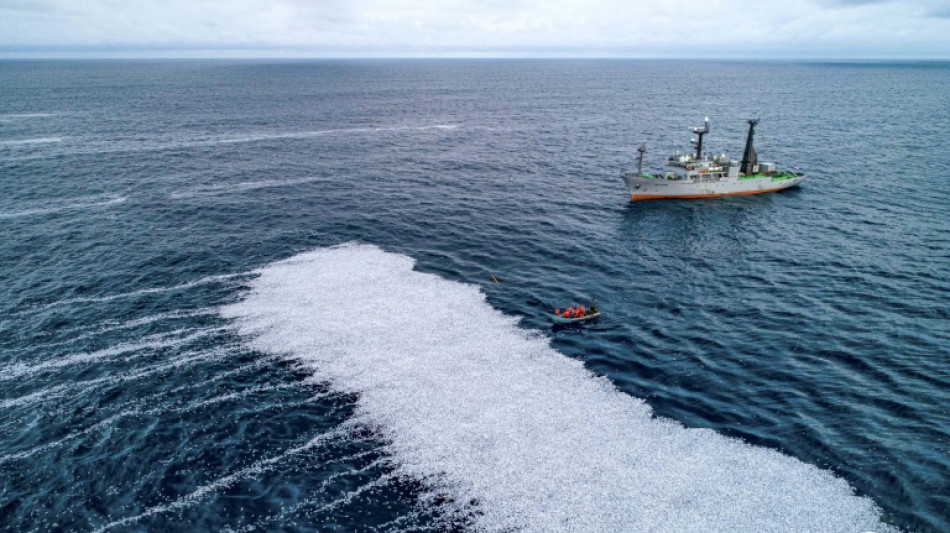
-
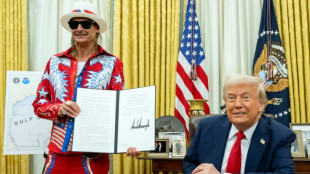 Trump signs executive order targeting ticket scalping
Trump signs executive order targeting ticket scalping
-
Eurozone inflation eases in March as tariff threat looms

-
 Howe targets 'game-changing' Champions League return for Newcastle
Howe targets 'game-changing' Champions League return for Newcastle
-
Chinese developer under scrutiny over Bangkok tower quake collapse

-
 Sirens wail and families cry at Myanmar disaster site
Sirens wail and families cry at Myanmar disaster site
-
Three things on Australia's former Russian tennis star Daria Kasatkina

-
 Stock markets rise ahead of Trump tariffs deadline
Stock markets rise ahead of Trump tariffs deadline
-
Facing US tariffs, Canadians hunt for business in Europe

-
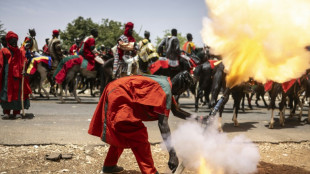 Trumpets, guns, horses: northern Nigeria's Durbar ends Ramadan in style
Trumpets, guns, horses: northern Nigeria's Durbar ends Ramadan in style
-
Defiant French far right insists 'we will win' despite Le Pen ban

-
 Hezbollah official among four dead in Israeli strike on Beirut
Hezbollah official among four dead in Israeli strike on Beirut
-
Liverpool's Slot unfazed by Alexander-Arnold Real Madrid links

-
 Hezbollah official targeted in deadly Israeli strike on Beirut
Hezbollah official targeted in deadly Israeli strike on Beirut
-
Israel PM drops security chief nominee under fire from Trump ally
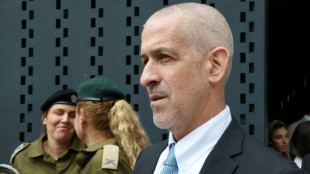
-
 Stock markets edge up but Trump tariff fears dampen mood
Stock markets edge up but Trump tariff fears dampen mood
-
South Korea court to rule Friday on president impeachment

-
 'Can collapse anytime': Mandalay quake victims seek respite outdoors
'Can collapse anytime': Mandalay quake victims seek respite outdoors
-
Stock markets edge back but Trump tariff fears dampen mood

-
 Myanmar holds minute of silence for more than 2,000 quake dead
Myanmar holds minute of silence for more than 2,000 quake dead
-
Kenya president still handing cash to churches despite his own ban

-
 Israeli strike on Beirut kills three
Israeli strike on Beirut kills three
-
Russia-born Kasatkina says 'didn't have much choice' after Australia switch

-
 Carmakers face doubts and jolts over US tariffs
Carmakers face doubts and jolts over US tariffs
-
China holds large-scale military drills around Taiwan

-
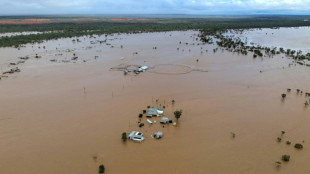 'Heartbreaking' floods swamp Australia's cattle country
'Heartbreaking' floods swamp Australia's cattle country
-
South Korean baseball put on hold after fan killed at stadium

-
 Celtics, Thunder power toward NBA playoffs, Lakers shoot down Rockets
Celtics, Thunder power toward NBA playoffs, Lakers shoot down Rockets
-
French prosecutors demand Volkswagen face fresh Dieselgate trial

-
 Sam Mendes to launch four 'Beatles' movies in same month
Sam Mendes to launch four 'Beatles' movies in same month
-
Battery boom drives Bangladesh lead poisoning epidemic
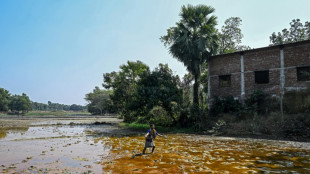
-
 South Korea president impeachment ruling Friday: court
South Korea president impeachment ruling Friday: court
-
Israel strikes Hezbollah operative in Beirut, kills 3

-
 Desperate Rohingya mark Eid in Indonesia limbo
Desperate Rohingya mark Eid in Indonesia limbo
-
Sam Kerr has 'full support' of Australia squad, vice-captain says

-
 Asian markets edge back but Trump tariff fears dampen mood
Asian markets edge back but Trump tariff fears dampen mood
-
Teenage opener Konstas gets Australia contract with Ashes on horizon

-
 S. Korea court to rule Friday on President Yoon impeachment
S. Korea court to rule Friday on President Yoon impeachment
-
Myanmar to hold minute of silence for more than 2,000 quake dead

-
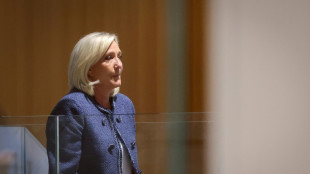 Far-right leaders rally around France's Le Pen after poll ban
Far-right leaders rally around France's Le Pen after poll ban
-
SpaceX launches private astronauts on first crewed polar orbit

-
 China launches military drills around Taiwan
China launches military drills around Taiwan
-
Political support leading to increasing fallout for crypto

-
 France's Le Pen seeks to keep presidency hopes alive after election ban
France's Le Pen seeks to keep presidency hopes alive after election ban
-
Trump tariffs threaten Latin American steel industry

-
 'Tariff man': Trump's long history with trade wars
'Tariff man': Trump's long history with trade wars
-
Tariffs: Economic 'liberation' or straitjacket?

-
 Undocumented migrants turn to Whatsapp to stay ahead of US raids
Undocumented migrants turn to Whatsapp to stay ahead of US raids
-
What next for Venezuela as Trump goes after oil revenues?

-
 New Zealand Rugby and Ineos settle sponsorship dispute
New Zealand Rugby and Ineos settle sponsorship dispute
-
China says launches military exercises around Taiwan


Fresh hopes for landmark treaty to rescue ocean life
World leaders are under pressure to conclude years of talks on an agreement to protect open oceans that help sustain life on Earth, cover almost half the planet and currently fall under no country's laws.
As plans to protect and restore ecosystems across the world are mainstreamed, conservationists hope an oceans summit in France this week will give fresh momentum to efforts to finalise a legally binding UN treaty on the high seas.
The issue could not be more urgent, they say.
Oceans produce half the oxygen we breathe, regulate the weather and provide humanity's single largest source of protein.
But they are being pushed to the brink by human activities.
Carbon dioxide emissions and global warming drive devastating heatwaves and acidification, while humans have fished some marine species to the edge of extinction and used the world's waters as a garbage dump.
"The oceans as a whole are becoming warmer, the salinity levels are increasing. There's less oxygen for marine life," said Liz Karan, an expert with The Pew Charitable Trusts.
Even if a new treaty cannot solve all these problems, she said the accord was "more important than ever".
"What it can do is to ensure that there are refuges in place, great protected areas in place, that can give marine species a chance to breathe, an opportunity to survive and adapt to climate change."
- 'Greatest opportunity' -
Today, a patchwork of agreements and regulatory bodies govern shipping, fishing, and mineral extraction, while the UN Convention on the Law of the Sea, negotiated in the 1970s, lays out rules for how far a nation's zone of influence extends beyond its shores.
But despite two decades of consultations and negotiations, there is still no treaty protecting international waters -- those marine areas beyond national jurisdiction, accounting for about two-thirds of the world's oceans.
A new round of UN talks in March will aim to conclude the agreement.
"We sometimes say this is the most important environmental treaty that most people haven't even heard of," said Peggy Kalas, director of the High Seas Alliance, which brings together some 40 NGOs and the International Union for Conservation of Nature (IUCN).
The issue is finally gathering wider attention, she said, adding that meetings like the One Ocean Summit being held this week in the north-western French port city of Brest can help add to the pressure on governments to reach an agreement.
"It is really the greatest opportunity in a generation to conserve ocean life and diversity on a global scale," she told AFP.
- Shared responsibility -
Several issues divide nations on how best to manage the world's vast expanse of open ocean.
Among the chief issues up for debate are the creation of marine protected areas and the scope for curbing large-scale commercial fishing.
Another contentious question is who gets a share of the benefits from the exploitation of what are known as "marine genetic resources".
Poorer countries fear they will be sidelined as wealthier nations scour the seas for the next wonder ingredients for the pharmaceutical, chemical or cosmetic industries, and lock up the spoils in trademarks and patents.
"They want any financial gain originating from the resources of the high seas to fall under a benefit-sharing regime," said Andre Abreu, of the Tara Ocean Foundation.
An indication of the continued wrangling is the sheer number of sections in the latest treaty draft from 2019 still in tentative square brackets.
These include several overarching statements for the high seas, like the reference to the "polluter pays principle" and the "common heritage of mankind", a designation that currently only applies to the world's sea beds.
Other issues on the table include how to set up environmental impact assessments, enforcement and technology transfer.
The concept of marine protected areas has gathered significant international support, with more than 75 countries backing a plan to create conservation areas covering 30 percent of the world's land and oceans by 2030.
But the High Seas Alliance said a key issue will be if the treaty allows individual states to be able to veto the creation of a marine protected area.
"We're at the stage where we really need leadership from the highest level," Kalas said.
"This is urgent, every day and year it is delayed, there is biodiversity loss. We need to conclude these negotiations."
O.M.Souza--AMWN